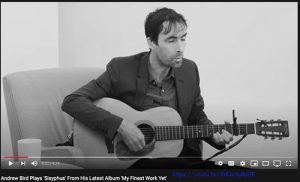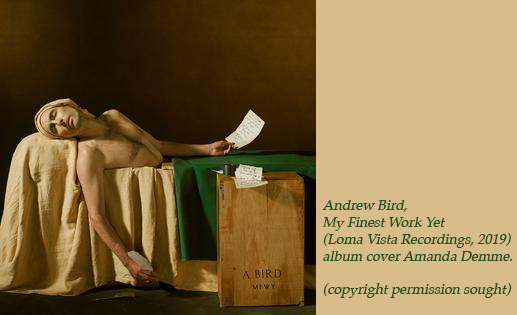———— Post by Sophia Ison*
Andrew Bird’s music is often filled with philosophical themes, historical events, current issues, and scientific reference. He also dabbles in exploring classical myths. The folk indie song “Sisyphus”, by whistler extraordinaire Andrew Bird, depicts the endless labor of the previously named Greek hero/mischief-maker.  Bird focuses his retelling on the moment Sisyphus faces the critical choice whether to keep going or to let the boulder sweep down the mountain as it has for every day since he was condemned by the gods.
Bird focuses his retelling on the moment Sisyphus faces the critical choice whether to keep going or to let the boulder sweep down the mountain as it has for every day since he was condemned by the gods.
Since antiquity, authors have normally cast Sisyphus’ activity as an eternal punishment. In 1940, Albert Camus championed Sisyphus as the absurdist hero in his landmark essay The Myth of Sisyphus. Camus’ reconstruction of the myth posits that Sisyphus willingly and daily chooses to continue a pointless task and that he should be imaged as happy while doing it. While Andrew Bird does appear to reference Camus’ interpretation of the myth, Bird deviates toward the end and perhaps alludes to a conclusion against Camus, where one instead finds happiness in community.
Bird seems to refer to Camus when he makes Sisyphus pause.
Sisyphus peered into the mist
A stone’s throw from the precipice, paused – Bird
It is during that return, that pause, that Sisyphus interests me. – Camus
In Bird’s song, he sings the lyric “paused”, fading the song’s rhythm slightly as no music plays in the interlude until Bird starts to sing again. This emphasizes the word “pause” by inserting a temporary, intentional, and literal fermata. That pause was also noted, very overtly, by Camus.
Like Camus, Bird also uses present tense to note that the myth is still happening.
I’m letting it roll away. – Bird
The rock is still rolling. – Camus

Bird shows that Sisyphus is consciously choosing to let go of the rock so that he can start his labors once again. Bird remarked in an interview that the Sisyphus myth “is about being addicted to your own suffering, I guess.” Following Camus, Bird seems to declare that the rock continues rolling today. In the context of Camus’ essay, this eternal struggle is what allows Sisyphus to be the absurdist hero.
While the ancient depiction of the myth seems to see Sisyphus’ punishment as a fate declared by the gods, Bird and Camus harmonize in their assertion that Sisyphus has his free will and agency.
It’s got nothing to do with fate
And everything to do with you – Bird
All Sisyphus’ silent joy is contained therein. His fate belongs to him. – Camus
Bird’s clear nod to Camus reverberates the idea that one is responsible for one’s own life. As Camus famously said “One must imagine Sisyphus happy.” Despite unchanging environments Camus shows there is a choice to be happy or to imagine others as such.
The same interview with Bird reveals that he relates on a personal level to Sisyphus but that happiness can also be found in relationships with friends and family.
Bird: I’m happiest when I’m struggling up a literal or figurative hill. Sometimes I stop and say, “What’s the collateral damage of this inclination? And the moral consequences of abandoning this eternal task? Maybe the rock’s going to roll down and hurt somebody.”
Interviewer: Who’s at risk of being crushed by the rock?
Bird: In that lyric, “to fail like a mortal” is to give up on immortality in favor of friends and family, community. Harmony and happiness instead of tortured godliness.
These comments give insight into Bird’s meaning behind the lyrics. Bird seems to focus on an individual’s relationship with a collective group. Perhaps Bird is suggesting that social support and friendships bring meaning to life. This would contrast Camus’ claim that there is no true meaning to life and that accepting the absurd is the best way to digest this. The Sisyphus of both Bird and Camus is not defined by fate. The philosopher and the singer, however, seem to diverge at what motivates Sisyphus.
Bird’s powerful line, “It’s got nothing to do with fate, And everything to do with you” can leave a listener asking “who is the ‘you’ he is referring to?” It is possible that Bird had someone in mind, but it is also possible that the ‘you’ is the listener of the song. As a benign instructor, Bird draws each listener into the myth for a moment of life-coaching. Fate and determinism are cast aside and he tells you that it is your free will that governors your life. While Bird seems to think community can foster happiness, he makes no explicit statement of this in the song, offering you the chance to choose for yourself.
——— Sophia Ison is a senior majoring in Classical Studies at Brigham Young University
Bibliography
Andrew Bird, “Sisyphus.” Track #1 on My Finest Work Yet. Loma Vista Recordings, 2019, compact disc. –– http://ogcma.byu.edu/Sisyphus2.0016_Bird.htm
Camus, Albert. 1942/1955. Le mythe de Sisyphe: essai sur l’absurde. The Myth of Sisyphus. Translated by Justin O’Brien. Penguin Modern Classics. London, England: Penguin Classics. –– http://ogcma.byu.edu/Sisyphus1.0023_Camus.htm



